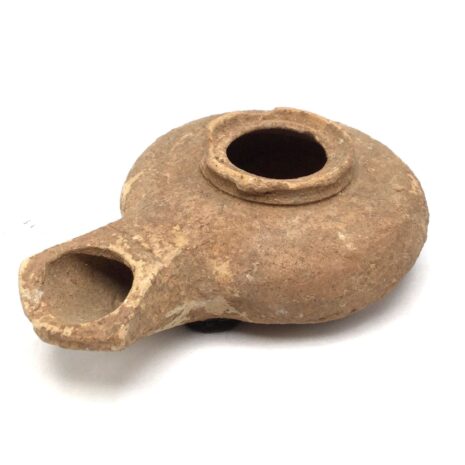SOLD Ancient Catacomb Terracotta Oil Lamp, Roman Empire
$155.00
Early Christianity oil lamps were also seen as a symbol of light and a manifestations of the presence of the divine.
Out of stock
Description
Although most famous for Christian burials, people of all religions were interred in the catacombs due to a shortage of land and demand for burial space after a switch from cremations to underground burials in the 2nd century A.D. Roman made closed earthenware terracotta lamps became the dominant oil lamp style in the Roman world as an inexpensive alternative to candles made from beeswax, tallow or animal fat. Oils often made from Spanish olives were poured into the lamp through its central hole, and a linen, flax, or papyrus wick was inserted through the nozzle spout and ignited at the wick’s tip. Although oil lamps were handmade, most were made using bivalve moulds to create consistent quality. With or without handles, plain or with decorative designs, they were often covered with a light slip after the halves were securely joined to prevent oil from seeping through the porous clay, a technique first used by the Greeks who exported lamps throughout the Mediterranean. The central hole receiving oil and the wick nozzle were cut and the lamp was left to dry before being fired in a kiln. Early Christianity oil lamps were also seen as a symbol of light and a manifestations of the presence of the divine.
Additional information
| Place of Origin | Ancient Mediterranean |
|---|---|
| Period | Ancient, Roman Empire |
| Date | 2nd Century CE |
| Materials and Technique | Earthenware |
| Dimensions (inches) | Ht: 1.125” W: 3.5” D: 2.375” |
| Dimensions (metric) | Ht: 2.60cm W: 8.89cm D: 6.03cm |
| Weight | 1.5oz |
| Condition | Very good, see description |
| Item Number | 1885A-QAR |
| Shipping Box Size | |
| Width | 0” to 5.9” |










